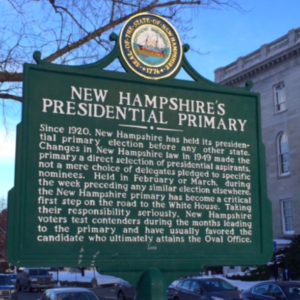Fewer than half of self-identified Democrats in New Hampshire support the state’s “First In The Nation” primary law, and just a quarter strongly support it, according to the latest poll from the UNH Survey Center. It’s yet another sign of the weak support the primary has among Granite State Democrats, including elected officials, in the face of accusations the state’s voters are “too white.”
In 2019, 61 percent of New Hampshire Democrats told UNH they strongly or somewhat supported the law mandating the state’s primary be held at least one week before a similar contest. By July of 2021, that number was down to 46 percent. In the new UNH survey, only 45 percent of Democrats back the FITN law — 28 percent of them strongly. Another 10 percent oppose the law outright.
In comparison, 60 percent of Republicans want to keep the Granite State at the front of the presidential primary line, 46 percent strongly. The number of Republicans who oppose the law?
Zero percent.
Granite State Democratic leaders are under fire from political and business leaders concerned over their apparent mishandling of the state’s First In The Nation status. Every four years, the presidential campaigns provide a boon to both its prestige and its economy. For years, national Democrats have disparaged the state as “too white” to be allowed to hold the first primary, suggesting Democratic primary voters were either burdened by “white privilege” or simply too racist to be trusted with such an important role in the presidential process.
Senators Maggie Hassan and Jeanne Shaheen have been repeatedly asked to defend New Hampshire Democratic voters from these charges, but they declined to do so.
“Guess what — we’re ‘woke!'” one longtime political insider told NHJournal. “But when Nevada was taking our primary, Buckley was asleep.”
(The latest betting markets pick Nevada as the state most likely to host the Democrats’ first primary in 2024.)
Sources involved in Granite State politics on both sides of the aisle point to Democratic State Party Chair Ray Buckley as part of the problem. He’s been outmaneuvered by representatives of other states, who were able to convince the Democratic National Committee to throw open the early primary calendar to all comers. Critics also point to Buckley’s risky decision to hand over the lead role on the Rules and Bylaws Committee to Joanne Dowdell a Washington, D.C. resident with limited ties to New Hampshire and little influence with the DNC.
It’s a risk that has not paid off. And some Democrats fear losing the FITN primary could add to Democrats’ woes in November.
“We’re seeing a growing narrative that blames Democrats for jeopardizing New Hampshire’s first in the nation status,” Shaheen told the DNC last week. “With such a tight Senate race and newly redrawn congressional maps, I fear stripping New Hampshire of its long-held position could be consequential.”
Asked by NHJournal why she has never rebutted claims from DNC leadership that the Granite State’s Democratic voters couldn’t be trusted to treat candidates of color fairly, Shaheen declined to respond.
During the 2020 presidential primary, many Democrats spoke out attacking the Granite State’s historic role in the process, including former DNC Chairman Tom Perez. Prominent Democrats, including U.S. Sen. Cory Booker, former HUD Secretary Julian Castro, and former DNC chair Howard Dean have said New Hampshire and Iowa have populations that are too white to hold key early primaries for their party. Progressive activists have been blunter about those early primary states: “White supremacy is not just a Fox News problem, folks.”
Next door in Massachusetts, Sen. Elizabeth Warren was asked during the 2020 campaign if she supported the Granite State’s “First In The Nation” status, Warren declined to answer.
Asked on Friday by reporters after the town hall if she thinks New Hampshire should keep its first-in-the-nation presidential primary status, Warren didn’t directly answer.
Interestingly, progressive Congressman Ro Khanna (D-Calif), speaking at a book signing in Exeter, N.H., made a stronger case for keeping New Hampshire at the front of the line than many Granite State Democrats.
“I think having New Hampshire pick first is great,” said Khanna, whose parents came to the U.S. from India. “I don’t think it can be first on its own. I think it has to be in conjunction with a Nevada and a South Carolina because then that provides for diversity.”
Khanna pointed to the tradition of one-on-one retail politics in the state, and he also argued that Democrats need to learn how to reach the white, blue-collar voters found in the Granite State.
“We have to do well with voters who are Black and Latino, but we also have to do well and speak to voters who are white. We have to be able to win voters across the country,” Khanna said. “And we shouldn’t be writing off places just because they’re white. I think it is a big mistake for the party to think we can just run up the score in certain places, and that would win.
“Look, I don’t know if it could win or not, but it’s certainly not going to help unify the country. It’s certainly not going to help bring the country together,” Khanna added.
“And so for all those reasons, I hope New Hampshire stays first.”





